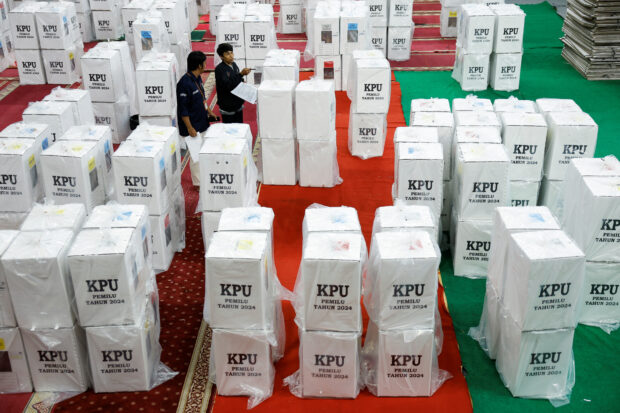How Indonesia holds the world’s biggest single-day election

Election commission officers check ballot boxes and other logistics as they prepare for the upcoming general election, in Jakarta, Indonesia, February 6, 2024. REUTERS
Indonesia holds simultaneous presidential and legislative elections on Feb. 14. Here’s what to expect on the day and in the aftermath.
What’s being decided?
In the world’s biggest single-day election, Indonesians will choose a new president and vice president, a parliament, and lawmakers among 20,000 administrative posts across the country.
Each voter will on five ballot papers choose their preferred presidential and vice presidential pairing, lawmakers at the national, provincial, and regency level, and a regional senator to advise the national parliament.
READ: Huge rallies in Indonesia as candidates finish election campaign
What will election day look like?
There are roughly 205 million registered voters and turnout in past elections has been about 75%, according to the International Foundation for Electoral Systems, a U.S.-based organization that provides technical support for elections.
Article continues after this advertisementVoters have a six-hour window to cast their ballots. Indonesia has three timezones and the first polls, in the east, open at 2200 GMT on Feb. 13, and all will be closed by 0600 GMT on Feb. 14. Voting booths will be overseen by election officials, party members and independent observers to safeguard against manipulation. Polls must be closed nationwide before counting can begin.
Article continues after this advertisementVoters cast a secret ballot and dip fingers in indelible ink to prevent duplicate voting.
While an official vote count by the poll body is expected to last late into election night, quick counts by independent survey agencies should provide an early indication of results from 0800 GMT.
Political parties need 4% of votes to qualify for national parliament. A presidential candidate needs more than 50% of votes cast overall and at least 20% of votes in more than half the country’s provinces to win.
If no one manages that, a run-off presidential election will be held in June between the two candidates with the most votes. The next president will take office in October.
What happens next?
For four months, presidential and legislative candidates have held rallies across the country to drum up support. Between Feb. 11 and Feb. 13, they must enter a quiet period, when no campaigning is allowed, until election day on Feb. 14.
While unofficial results should be clear within 24 hours of voting, the national poll body will only announce finalized results 35 days later, at the earliest. Disputes or complaints must be filed to the election watchdog within that time.
Will the process go smoothly?
Though the past two elections were deemed free and fair, the losing candidate both times, Prabowo Subianto, refused to concede, alleging cheating had robbed him of victory. In 2019, rioting over the outcome saw eight people killed and hundreds wounded in clashes. Prabowo, the incumbent defense minister, is again running for the presidency this time, his third attempt.
READ: Once disgraced, Prabowo eyes Indonesia presidency after makeover
Any challenge to the 2024 result could be troublesome. Election disputes are handled by the Constitutional Court, but its credibility has been dented of late by allegations its neutrality has been compromised and it has succumbed to interference by incumbent President Joko Widodo, whose son is the running mate of Prabowo.